
griptape
Modular Python framework for AI agents and workflows with chain-of-thought reasoning, tools, and memory.
Stars: 2235

Griptape is a modular Python framework for building AI-powered applications that securely connect to your enterprise data and APIs. It offers developers the ability to maintain control and flexibility at every step. Griptape's core components include Structures (Agents, Pipelines, and Workflows), Tasks, Tools, Memory (Conversation Memory, Task Memory, and Meta Memory), Drivers (Prompt and Embedding Drivers, Vector Store Drivers, Image Generation Drivers, Image Query Drivers, SQL Drivers, Web Scraper Drivers, and Conversation Memory Drivers), Engines (Query Engines, Extraction Engines, Summary Engines, Image Generation Engines, and Image Query Engines), and additional components (Rulesets, Loaders, Artifacts, Chunkers, and Tokenizers). Griptape enables developers to create AI-powered applications with ease and efficiency.
README:
Griptape is a Python framework designed to simplify the development of generative AI (genAI) applications. It offers a set of straightforward, flexible abstractions for working with areas such as Large Language Models (LLMs), Retrieval-Augmented Generation (RAG), and much more.
- 🤖 Agents consist of a single Task, configured for Agent-specific behavior.
- 🔄 Pipelines organize a sequence of Tasks so that the output from one Task may flow into the next.
- 🌐 Workflows configure Tasks to operate in parallel.
Tasks are the core building blocks within Structures, enabling interaction with Engines, Tools, and other Griptape components.
- 💬 Conversation Memory enables LLMs to retain and retrieve information across interactions.
- 🗃️ Task Memory keeps large or sensitive Task outputs off the prompt that is sent to the LLM.
- 📊 Meta Memory enables passing in additional metadata to the LLM, enhancing the context and relevance of the interaction.
Drivers facilitate interactions with external resources and services in Griptape. They allow you to swap out functionality and providers with minimal changes to your business logic.
- 🗣️ Prompt Drivers: Manage textual and image interactions with LLMs.
- 🤖 Assistant Drivers: Enable interactions with various “assistant” services.
- 📜 Ruleset Drivers: Load and apply rulesets from external sources.
- 🧠 Conversation Memory Drivers: Store and retrieve conversational data.
- 📡 Event Listener Drivers: Forward framework events to external services.
- 🏗️ Structure Run Drivers: Execute structures locally or in the cloud.
- 🔢 Embedding Drivers: Generate vector embeddings from textual inputs.
- 🔀 Rerank Drivers: Rerank search results for improved relevance.
- 💾 Vector Store Drivers: Manage the storage and retrieval of embeddings.
- 🗂️ File Manager Drivers: Handle file operations on local and remote storage.
- 💼 SQL Drivers: Interact with SQL databases.
- 🎨 Image Generation Drivers: Create images from text descriptions.
- 🗣️ Text to Speech Drivers: Convert text to speech.
- 🎙️ Audio Transcription Drivers: Convert audio to text.
- 🔍 Web Search Drivers: Search the web for information.
- 🌐 Web Scraper Drivers: Extract data from web pages.
- 📈 Observability Drivers: Send trace and event data to observability platforms.
Tools provide capabilities for LLMs to interact with data and services. Griptape includes a variety of built-in Tools, and makes it easy to create custom Tools.
Engines wrap Drivers and provide use-case-specific functionality:
- 📊 RAG Engine is an abstraction for implementing modular Retrieval Augmented Generation (RAG) pipelines.
- 🛠️ Extraction Engine extracts JSON or CSV data from unstructured text.
- 📝 Summary Engine generates summaries from textual content.
- ✅ Eval Engine evaluates and scores the quality of generated text.
- 📐 Rulesets steer LLM behavior with minimal prompt engineering.
- 🔄 Loaders load data from various sources.
- 🏺 Artifacts allow for passing data of different types between Griptape components.
- ✂️ Chunkers segment texts into manageable pieces for diverse text types.
- 🔢 Tokenizers count the number of tokens in a text to not exceed LLM token limits.
Please visit the docs for information on installation and usage.
Check out Griptape Trade School for free online courses.
Here's a minimal example of griptape:
from griptape.drivers.prompt.openai import OpenAiChatPromptDriver
from griptape.rules import Rule
from griptape.tasks import PromptTask
task = PromptTask(
prompt_driver=OpenAiChatPromptDriver(model="gpt-4o"),
rules=[Rule("Keep your answer to a few sentences.")],
)
result = task.run("How do I do a kickflip?")
print(result.value)To do a kickflip, start by positioning your front foot slightly angled near the middle of the board and your back foot on the tail.
Pop the tail down with your back foot while flicking the edge of the board with your front foot to make it spin.
Jump and keep your body centered over the board, then catch it with your feet and land smoothly. Practice and patience are key!
Here is a concise example using griptape to research open source projects:
from griptape.drivers.prompt.openai_chat_prompt_driver import OpenAiChatPromptDriver
from griptape.drivers.web_search.duck_duck_go import DuckDuckGoWebSearchDriver
from griptape.rules import Rule, Ruleset
from griptape.structures import Workflow
from griptape.tasks import PromptTask, TextSummaryTask
from griptape.tools import WebScraperTool, WebSearchTool
from griptape.utils import StructureVisualizer
from pydantic import BaseModel
class Feature(BaseModel):
name: str
description: str
emoji: str
class Output(BaseModel):
answer: str
key_features: list[Feature]
projects = ["griptape", "langchain", "crew-ai", "pydantic-ai"]
prompt_driver = OpenAiChatPromptDriver(model="gpt-4o")
workflow = Workflow(
tasks=[
[
PromptTask(
id=f"project-{project}",
input="Tell me about the open source project: {{ project }}.",
prompt_driver=prompt_driver,
context={"project": projects},
output_schema=Output,
tools=[
WebSearchTool(
web_search_driver=DuckDuckGoWebSearchDriver(),
),
WebScraperTool(),
],
child_ids=["summary"],
)
for project in projects
],
TextSummaryTask(
input="{{ parents_output_text }}",
id="summary",
rulesets=[
Ruleset(
name="Format", rules=[Rule("Be detailed."), Rule("Include emojis.")]
)
],
),
]
)
workflow.run()
print(StructureVisualizer(workflow).to_url()) Output: Here's a detailed summary of the open-source projects mentioned:
1. **Griptape** 🛠️:
- Griptape is a modular Python framework designed for creating AI-powered applications. It focuses on securely connecting to
enterprise data and APIs. The framework provides structured components like Agents, Pipelines, and Workflows, allowing for both
parallel and sequential operations. It includes built-in tools and supports custom tool creation for data and service
interaction.
2. **LangChain** 🔗:
- LangChain is a framework for building applications powered by Large Language Models (LLMs). It offers a standard interface
for models, embeddings, and vector stores, facilitating real-time data augmentation and model interoperability. LangChain
integrates with various data sources and external systems, making it adaptable to evolving technologies.
3. **CrewAI** 🤖:
- CrewAI is a standalone Python framework for orchestrating multi-agent AI systems. It allows developers to create and
manage AI agents that collaborate on complex tasks. CrewAI emphasizes ease of use and scalability, providing tools and
documentation to help developers build AI-powered solutions.
4. **Pydantic-AI** 🧩:
- Pydantic-AI is a Python agent framework that simplifies the development of production-grade applications with Generative
AI. Built on Pydantic, it supports various AI models and provides features like type-safe design, structured response
validation, and dependency injection. Pydantic-AI aims to bring the ease of FastAPI development to AI applications.
These projects offer diverse tools and frameworks for developing AI applications, each with unique features and capabilities
tailored to different aspects of AI development.
graph TD;
griptape-->summary;
langchain-->summary;
pydantic-ai-->summary;
crew-ai-->summary;Griptape uses Semantic Versioning.
Thank you for considering contributing to Griptape! Before you start, please review our Contributing Guidelines.
Griptape is available under the Apache 2.0 License.
For Tasks:
Click tags to check more tools for each tasksFor Jobs:
Alternative AI tools for griptape
Similar Open Source Tools

griptape
Griptape is a modular Python framework for building AI-powered applications that securely connect to your enterprise data and APIs. It offers developers the ability to maintain control and flexibility at every step. Griptape's core components include Structures (Agents, Pipelines, and Workflows), Tasks, Tools, Memory (Conversation Memory, Task Memory, and Meta Memory), Drivers (Prompt and Embedding Drivers, Vector Store Drivers, Image Generation Drivers, Image Query Drivers, SQL Drivers, Web Scraper Drivers, and Conversation Memory Drivers), Engines (Query Engines, Extraction Engines, Summary Engines, Image Generation Engines, and Image Query Engines), and additional components (Rulesets, Loaders, Artifacts, Chunkers, and Tokenizers). Griptape enables developers to create AI-powered applications with ease and efficiency.

TaskingAI
TaskingAI brings Firebase's simplicity to **AI-native app development**. The platform enables the creation of GPTs-like multi-tenant applications using a wide range of LLMs from various providers. It features distinct, modular functions such as Inference, Retrieval, Assistant, and Tool, seamlessly integrated to enhance the development process. TaskingAI’s cohesive design ensures an efficient, intelligent, and user-friendly experience in AI application development.

UltraRAG
The UltraRAG framework is a researcher and developer-friendly RAG system solution that simplifies the process from data construction to model fine-tuning in domain adaptation. It introduces an automated knowledge adaptation technology system, supporting no-code programming, one-click synthesis and fine-tuning, multidimensional evaluation, and research-friendly exploration work integration. The architecture consists of Frontend, Service, and Backend components, offering flexibility in customization and optimization. Performance evaluation in the legal field shows improved results compared to VanillaRAG, with specific metrics provided. The repository is licensed under Apache-2.0 and encourages citation for support.

koog
Koog is a Kotlin-based framework for building and running AI agents entirely in idiomatic Kotlin. It allows users to create agents that interact with tools, handle complex workflows, and communicate with users. Key features include pure Kotlin implementation, MCP integration, embedding capabilities, custom tool creation, ready-to-use components, intelligent history compression, powerful streaming API, persistent agent memory, comprehensive tracing, flexible graph workflows, modular feature system, scalable architecture, and multiplatform support.
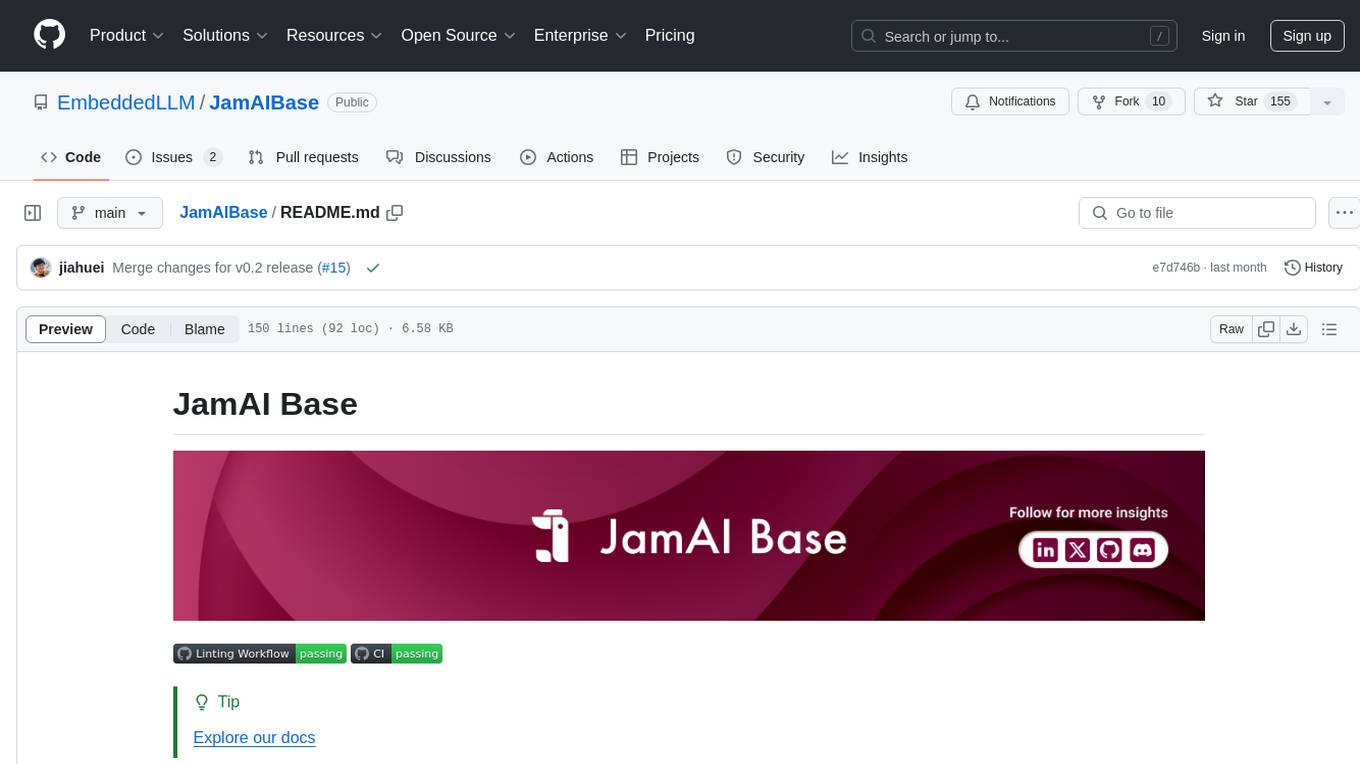
JamAIBase
JamAI Base is an open-source platform integrating SQLite and LanceDB databases with managed memory and RAG capabilities. It offers built-in LLM, vector embeddings, and reranker orchestration accessible through a spreadsheet-like UI and REST API. Users can transform static tables into dynamic entities, facilitate real-time interactions, manage structured data, and simplify chatbot development. The tool focuses on ease of use, scalability, flexibility, declarative paradigm, and innovative RAG techniques, making complex data operations accessible to users with varying technical expertise.
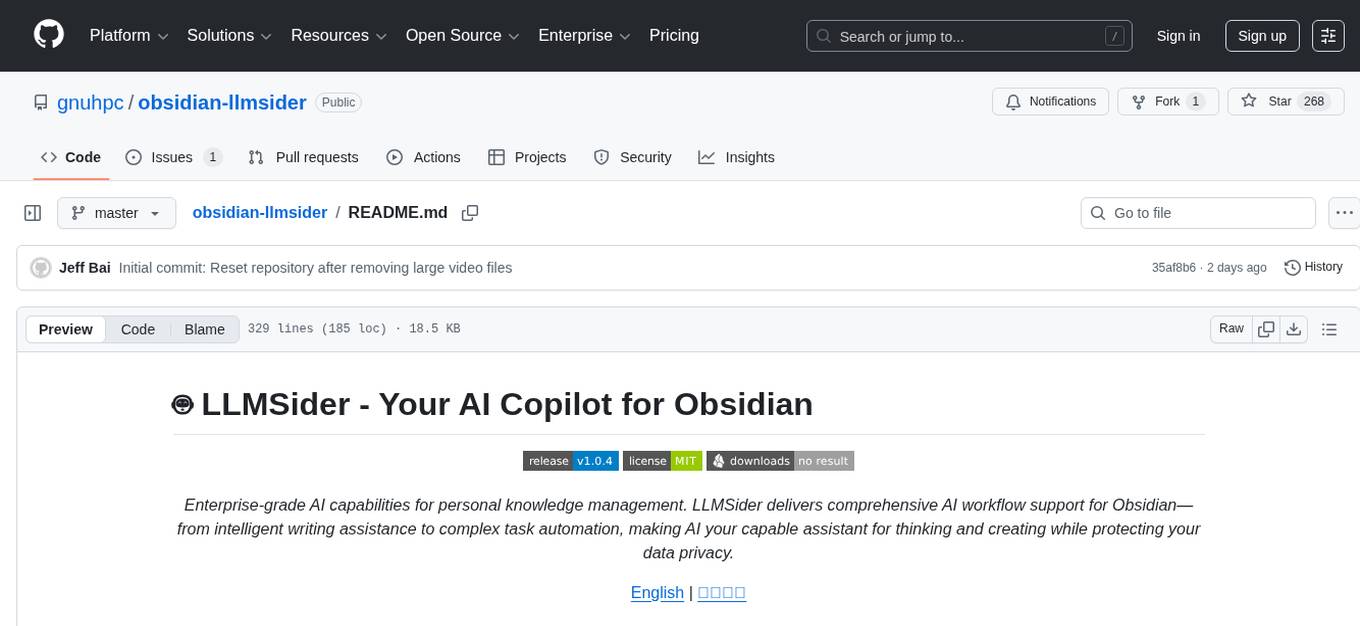
obsidian-llmsider
LLMSider is an AI assistant plugin for Obsidian that offers flexible multi-model support, deep workflow integration, privacy-first design, and a professional tool ecosystem. It provides comprehensive AI capabilities for personal knowledge management, from intelligent writing assistance to complex task automation, making AI a capable assistant for thinking and creating while ensuring data privacy.
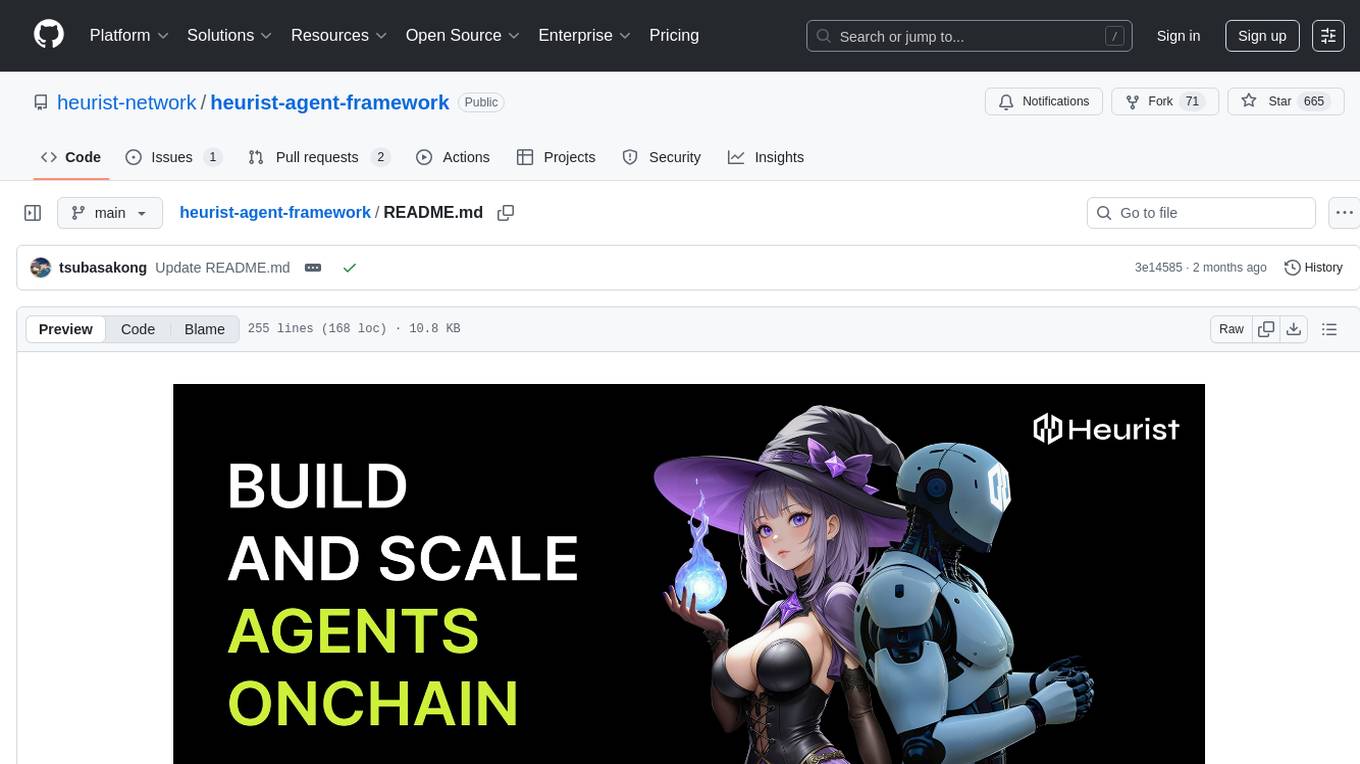
heurist-agent-framework
Heurist Agent Framework is a flexible multi-interface AI agent framework that allows processing text and voice messages, generating images and videos, interacting across multiple platforms, fetching and storing information in a knowledge base, accessing external APIs and tools, and composing complex workflows using Mesh Agents. It supports various platforms like Telegram, Discord, Twitter, Farcaster, REST API, and MCP. The framework is built on a modular architecture and provides core components, tools, workflows, and tool integration with MCP support.
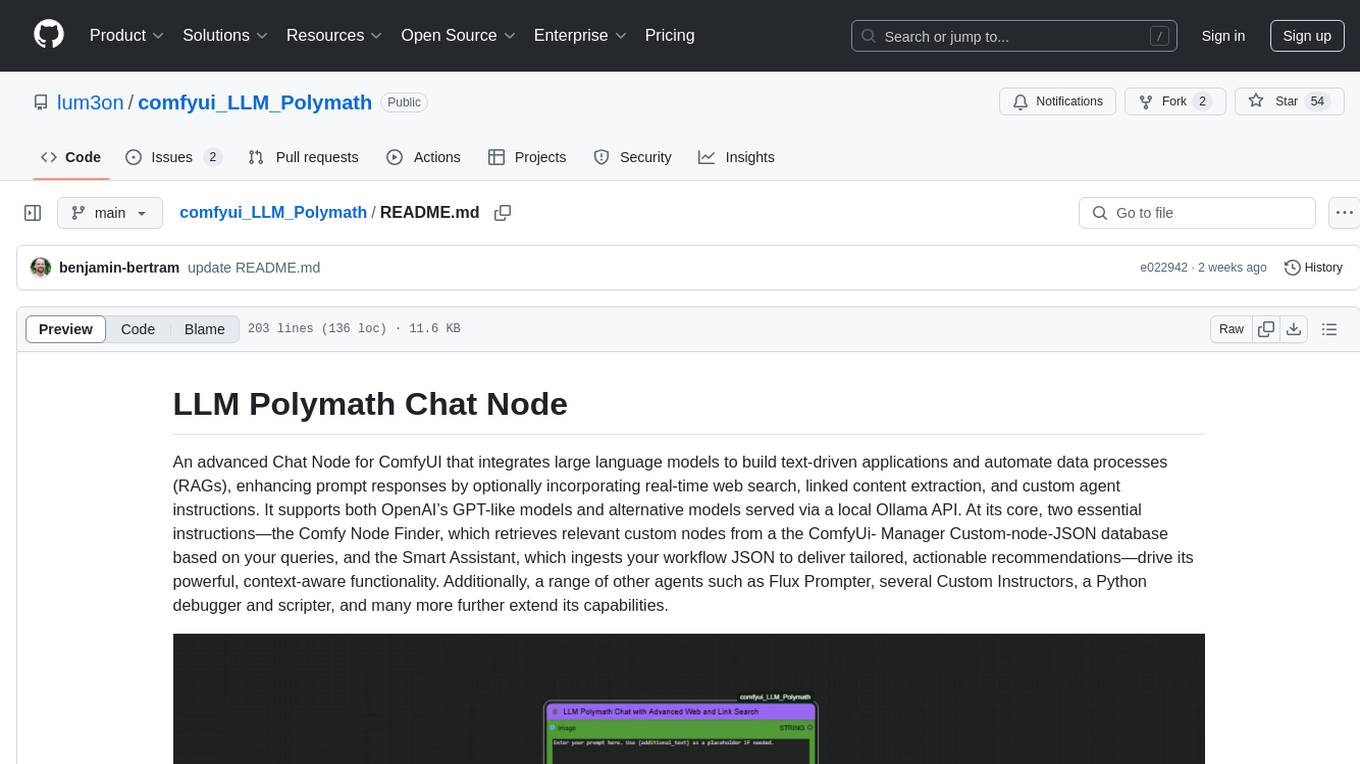
comfyui_LLM_Polymath
LLM Polymath Chat Node is an advanced Chat Node for ComfyUI that integrates large language models to build text-driven applications and automate data processes, enhancing prompt responses by incorporating real-time web search, linked content extraction, and custom agent instructions. It supports both OpenAI’s GPT-like models and alternative models served via a local Ollama API. The core functionalities include Comfy Node Finder and Smart Assistant, along with additional agents like Flux Prompter, Custom Instructors, Python debugger, and scripter. The tool offers features for prompt processing, web search integration, model & API integration, custom instructions, image handling, logging & debugging, output compression, and more.
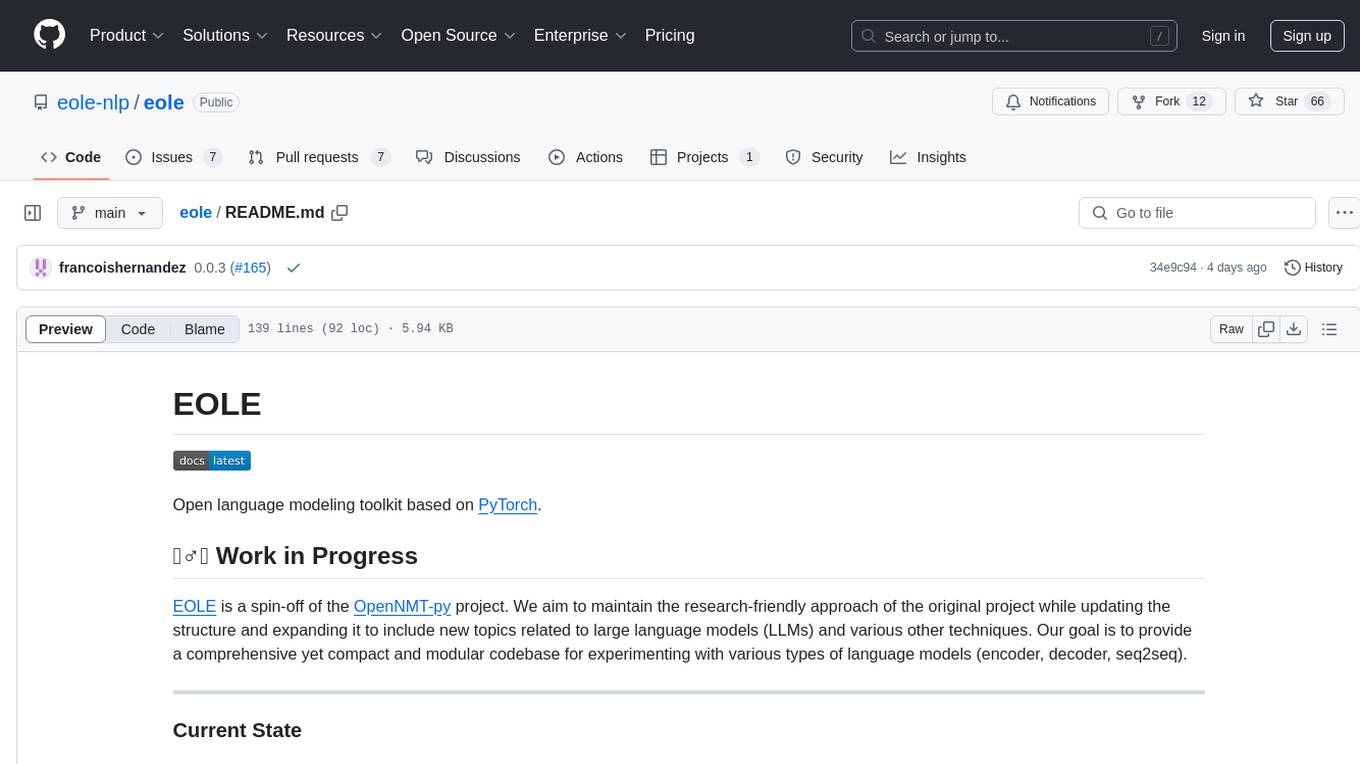
eole
EOLE is an open language modeling toolkit based on PyTorch. It aims to provide a research-friendly approach with a comprehensive yet compact and modular codebase for experimenting with various types of language models. The toolkit includes features such as versatile training and inference, dynamic data transforms, comprehensive large language model support, advanced quantization, efficient finetuning, flexible inference, and tensor parallelism. EOLE is a work in progress with ongoing enhancements in configuration management, command line entry points, reproducible recipes, core API simplification, and plans for further simplification, refactoring, inference server development, additional recipes, documentation enhancement, test coverage improvement, logging enhancements, and broader model support.
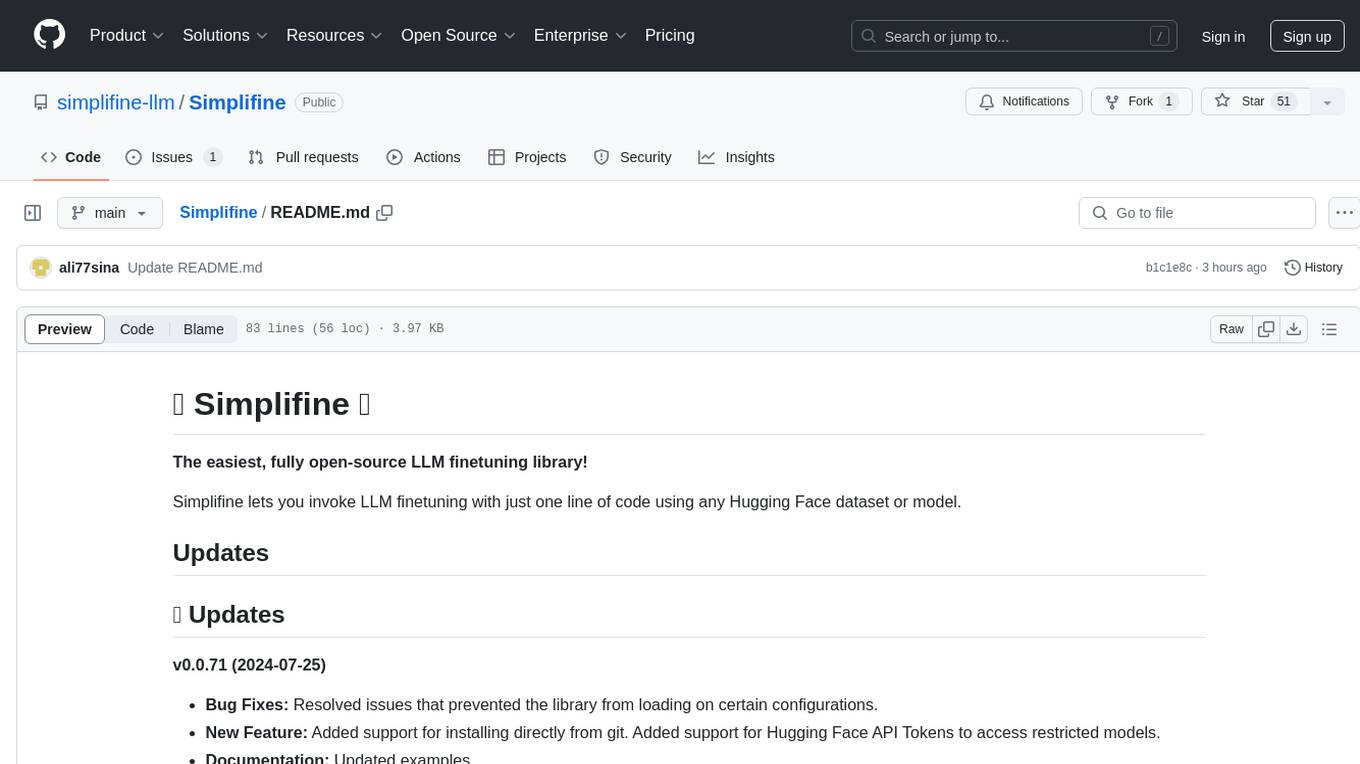
Simplifine
Simplifine is an open-source library designed for easy LLM finetuning, enabling users to perform tasks such as supervised fine tuning, question-answer finetuning, contrastive loss for embedding tasks, multi-label classification finetuning, and more. It provides features like WandB logging, in-built evaluation tools, automated finetuning parameters, and state-of-the-art optimization techniques. The library offers bug fixes, new features, and documentation updates in its latest version. Users can install Simplifine via pip or directly from GitHub. The project welcomes contributors and provides comprehensive documentation and support for users.
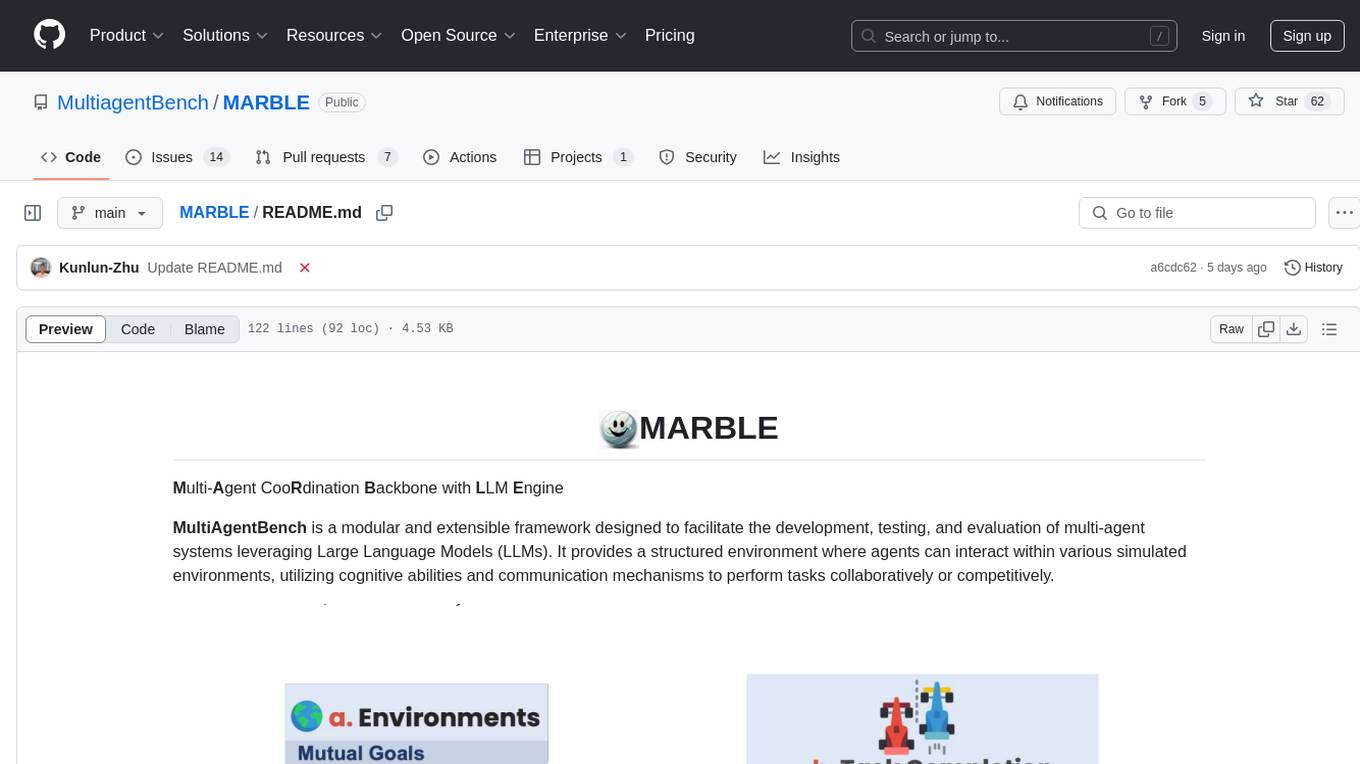
MARBLE
MARBLE (Multi-Agent Coordination Backbone with LLM Engine) is a modular framework for developing, testing, and evaluating multi-agent systems leveraging Large Language Models. It provides a structured environment for agents to interact in simulated environments, utilizing cognitive abilities and communication mechanisms for collaborative or competitive tasks. The framework features modular design, multi-agent support, LLM integration, shared memory, flexible environments, metrics and evaluation, industrial coding standards, and Docker support.

DevoxxGenieIDEAPlugin
Devoxx Genie is a Java-based IntelliJ IDEA plugin that integrates with local and cloud-based LLM providers to aid in reviewing, testing, and explaining project code. It supports features like code highlighting, chat conversations, and adding files/code snippets to context. Users can modify REST endpoints and LLM parameters in settings, including support for cloud-based LLMs. The plugin requires IntelliJ version 2023.3.4 and JDK 17. Building and publishing the plugin is done using Gradle tasks. Users can select an LLM provider, choose code, and use commands like review, explain, or generate unit tests for code analysis.
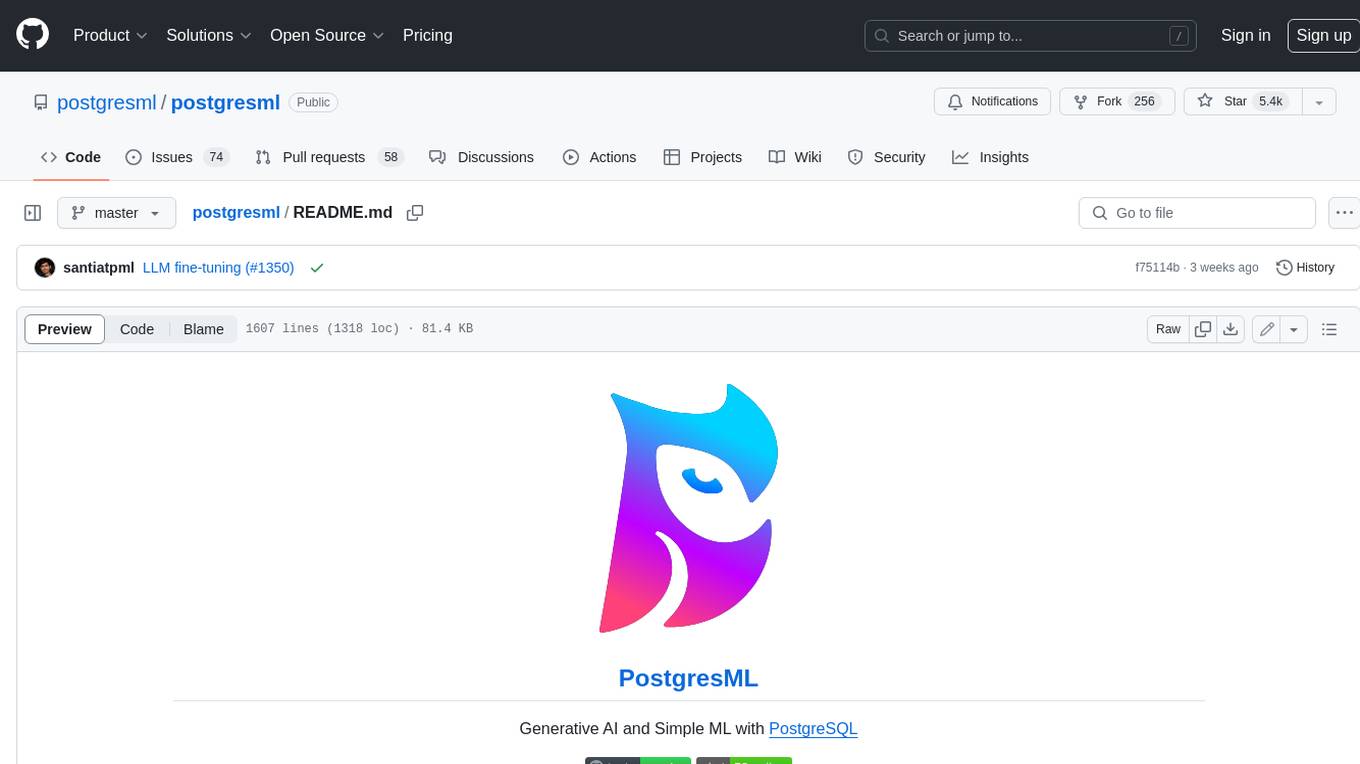
postgresml
PostgresML is a powerful Postgres extension that seamlessly combines data storage and machine learning inference within your database. It enables running machine learning and AI operations directly within PostgreSQL, leveraging GPU acceleration for faster computations, integrating state-of-the-art large language models, providing built-in functions for text processing, enabling efficient similarity search, offering diverse ML algorithms, ensuring high performance, scalability, and security, supporting a wide range of NLP tasks, and seamlessly integrating with existing PostgreSQL tools and client libraries.
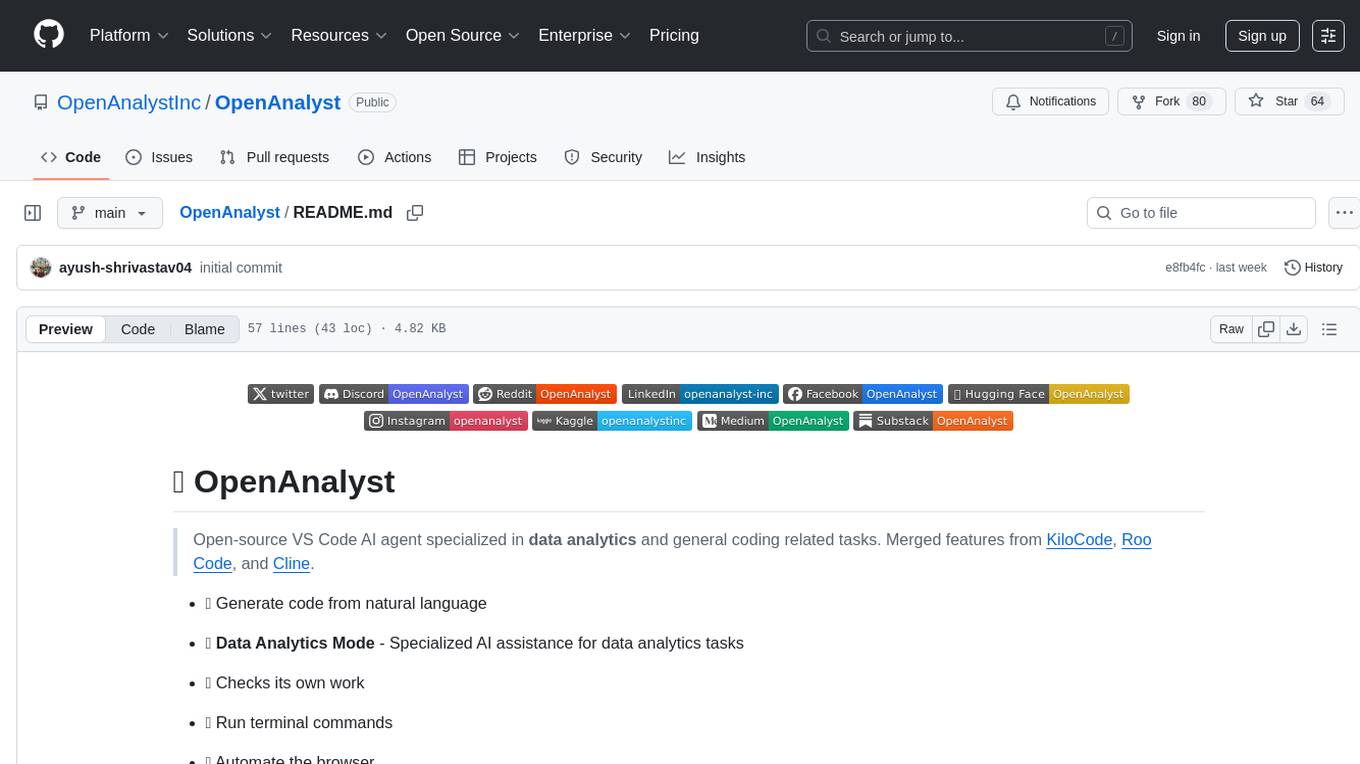
OpenAnalyst
OpenAnalyst is an open-source VS Code AI agent specialized in data analytics and general coding tasks. It merges features from KiloCode, Roo Code, and Cline, offering code generation from natural language, data analytics mode, self-checking, terminal command running, browser automation, latest AI models, and API keys option. It supports multi-mode operation for roles like Data Analyst, Code, Ask, and Debug. OpenAnalyst is a fork of KiloCode, combining the best features from Cline, Roo Code, and KiloCode, with enhancements like MCP Server Marketplace, automated refactoring, and support for latest AI models.
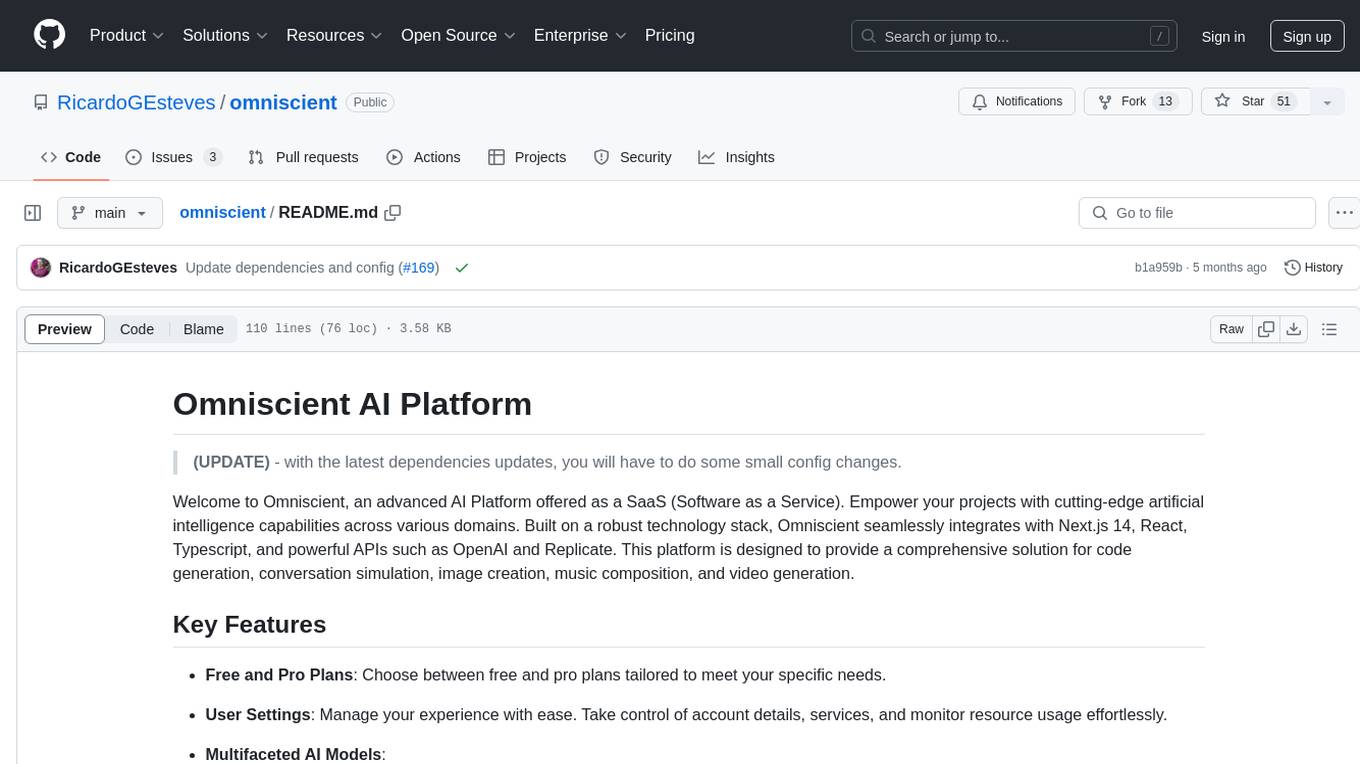
omniscient
Omniscient is an advanced AI Platform offered as a SaaS, empowering projects with cutting-edge artificial intelligence capabilities. Seamlessly integrating with Next.js 14, React, Typescript, and APIs like OpenAI and Replicate, it provides solutions for code generation, conversation simulation, image creation, music composition, and video generation.

kollektiv
Kollektiv is a Retrieval-Augmented Generation (RAG) system designed to enable users to chat with their favorite documentation easily. It aims to provide LLMs with access to the most up-to-date knowledge, reducing inaccuracies and improving productivity. The system utilizes intelligent web crawling, advanced document processing, vector search, multi-query expansion, smart re-ranking, AI-powered responses, and dynamic system prompts. The technical stack includes Python/FastAPI for backend, Supabase, ChromaDB, and Redis for storage, OpenAI and Anthropic Claude 3.5 Sonnet for AI/ML, and Chainlit for UI. Kollektiv is licensed under a modified version of the Apache License 2.0, allowing free use for non-commercial purposes.
For similar tasks

griptape
Griptape is a modular Python framework for building AI-powered applications that securely connect to your enterprise data and APIs. It offers developers the ability to maintain control and flexibility at every step. Griptape's core components include Structures (Agents, Pipelines, and Workflows), Tasks, Tools, Memory (Conversation Memory, Task Memory, and Meta Memory), Drivers (Prompt and Embedding Drivers, Vector Store Drivers, Image Generation Drivers, Image Query Drivers, SQL Drivers, Web Scraper Drivers, and Conversation Memory Drivers), Engines (Query Engines, Extraction Engines, Summary Engines, Image Generation Engines, and Image Query Engines), and additional components (Rulesets, Loaders, Artifacts, Chunkers, and Tokenizers). Griptape enables developers to create AI-powered applications with ease and efficiency.

AI-in-a-Box
AI-in-a-Box is a curated collection of solution accelerators that can help engineers establish their AI/ML environments and solutions rapidly and with minimal friction, while maintaining the highest standards of quality and efficiency. It provides essential guidance on the responsible use of AI and LLM technologies, specific security guidance for Generative AI (GenAI) applications, and best practices for scaling OpenAI applications within Azure. The available accelerators include: Azure ML Operationalization in-a-box, Edge AI in-a-box, Doc Intelligence in-a-box, Image and Video Analysis in-a-box, Cognitive Services Landing Zone in-a-box, Semantic Kernel Bot in-a-box, NLP to SQL in-a-box, Assistants API in-a-box, and Assistants API Bot in-a-box.
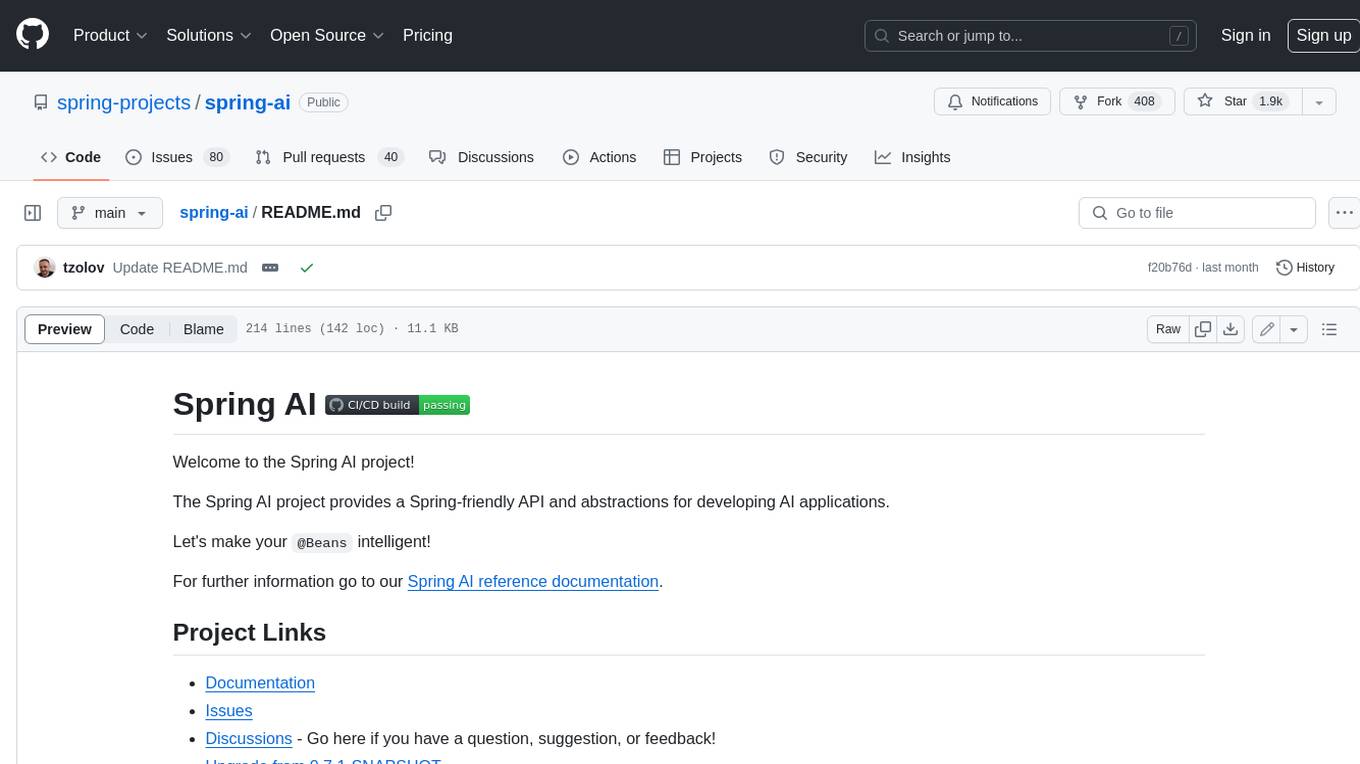
spring-ai
The Spring AI project provides a Spring-friendly API and abstractions for developing AI applications. It offers a portable client API for interacting with generative AI models, enabling developers to easily swap out implementations and access various models like OpenAI, Azure OpenAI, and HuggingFace. Spring AI also supports prompt engineering, providing classes and interfaces for creating and parsing prompts, as well as incorporating proprietary data into generative AI without retraining the model. This is achieved through Retrieval Augmented Generation (RAG), which involves extracting, transforming, and loading data into a vector database for use by AI models. Spring AI's VectorStore abstraction allows for seamless transitions between different vector database implementations.
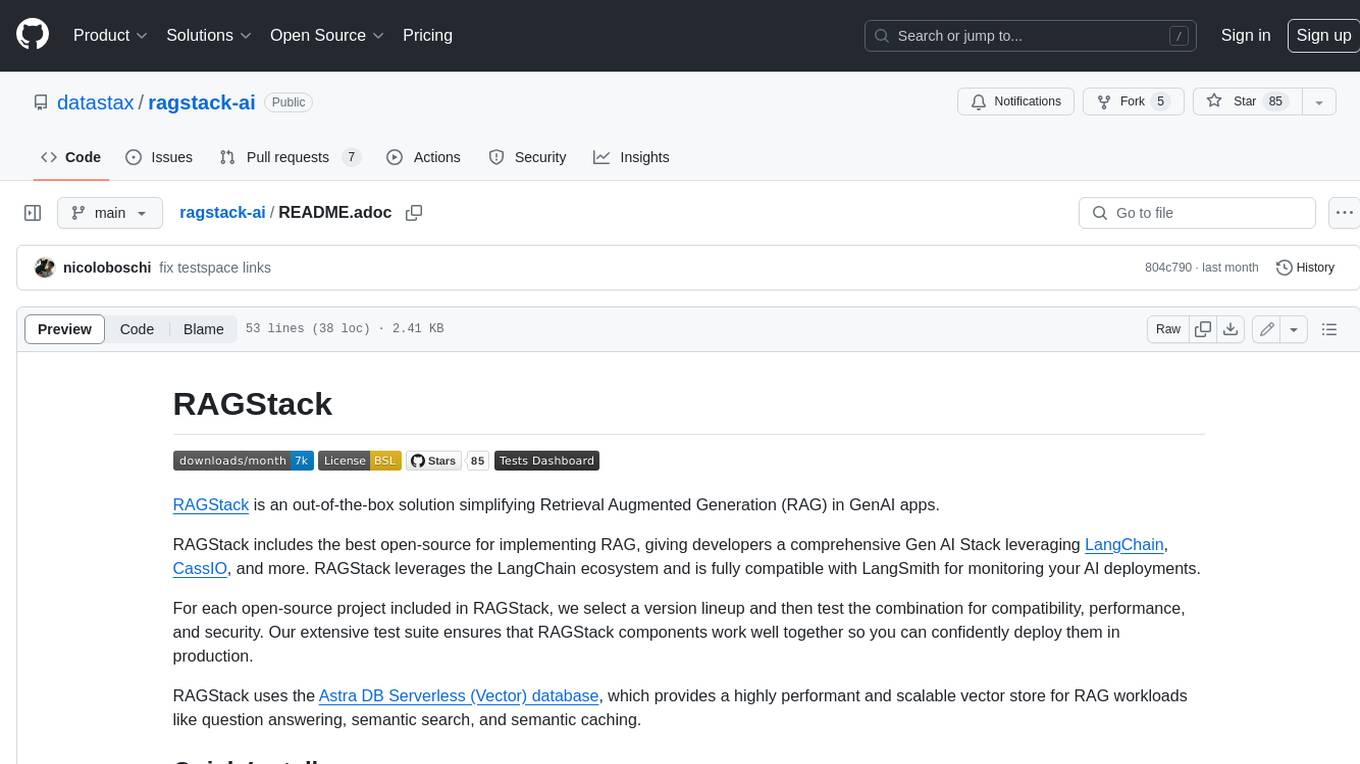
ragstack-ai
RAGStack is an out-of-the-box solution simplifying Retrieval Augmented Generation (RAG) in GenAI apps. RAGStack includes the best open-source for implementing RAG, giving developers a comprehensive Gen AI Stack leveraging LangChain, CassIO, and more. RAGStack leverages the LangChain ecosystem and is fully compatible with LangSmith for monitoring your AI deployments.
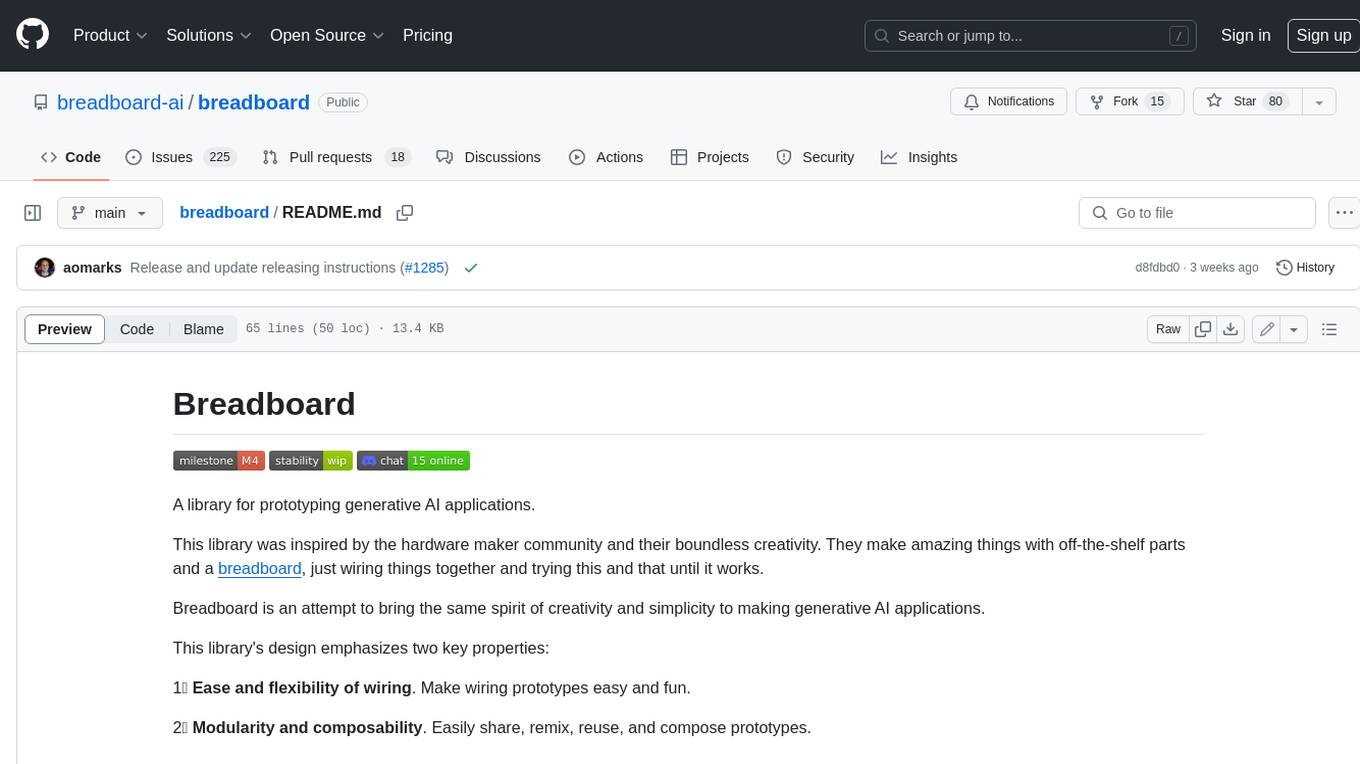
breadboard
Breadboard is a library for prototyping generative AI applications. It is inspired by the hardware maker community and their boundless creativity. Breadboard makes it easy to wire prototypes and share, remix, reuse, and compose them. The library emphasizes ease and flexibility of wiring, as well as modularity and composability.
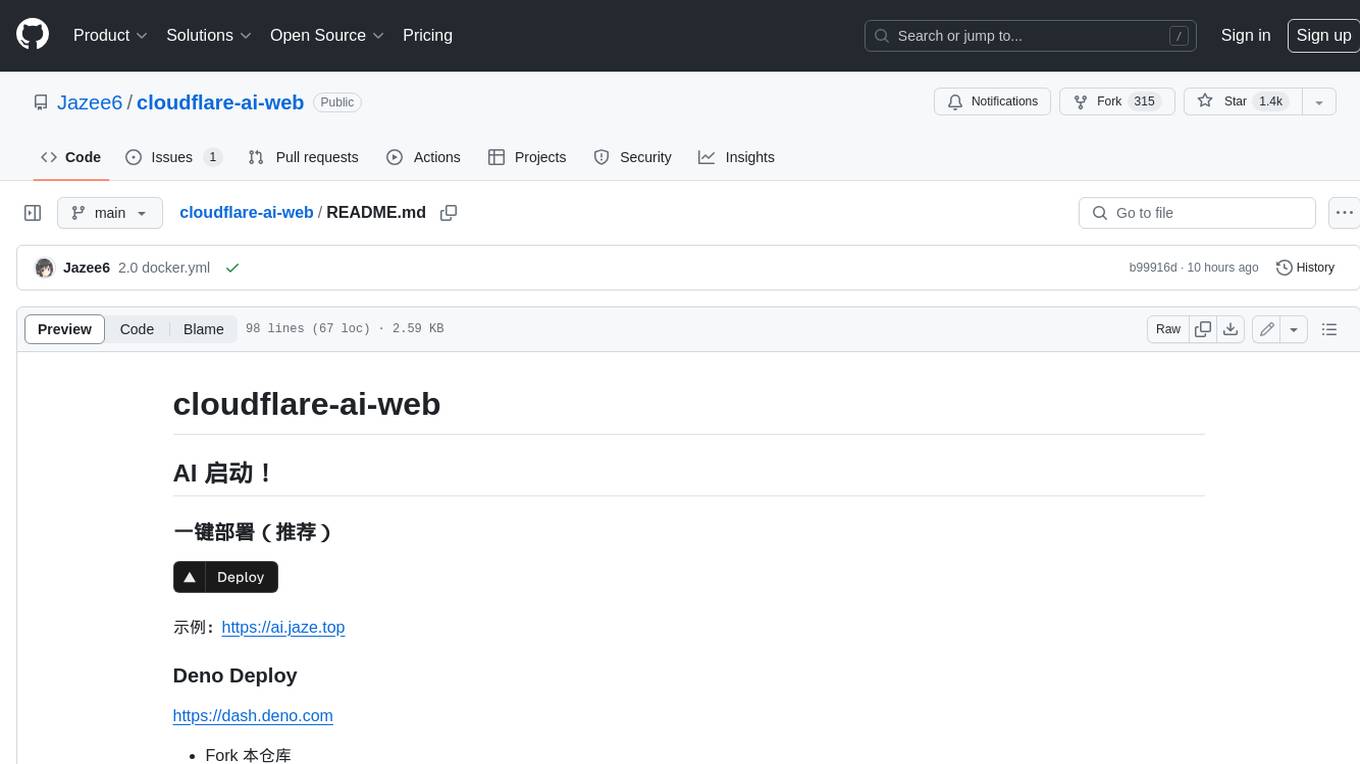
cloudflare-ai-web
Cloudflare-ai-web is a lightweight and easy-to-use tool that allows you to quickly deploy a multi-modal AI platform using Cloudflare Workers AI. It supports serverless deployment, password protection, and local storage of chat logs. With a size of only ~638 kB gzip, it is a great option for building AI-powered applications without the need for a dedicated server.
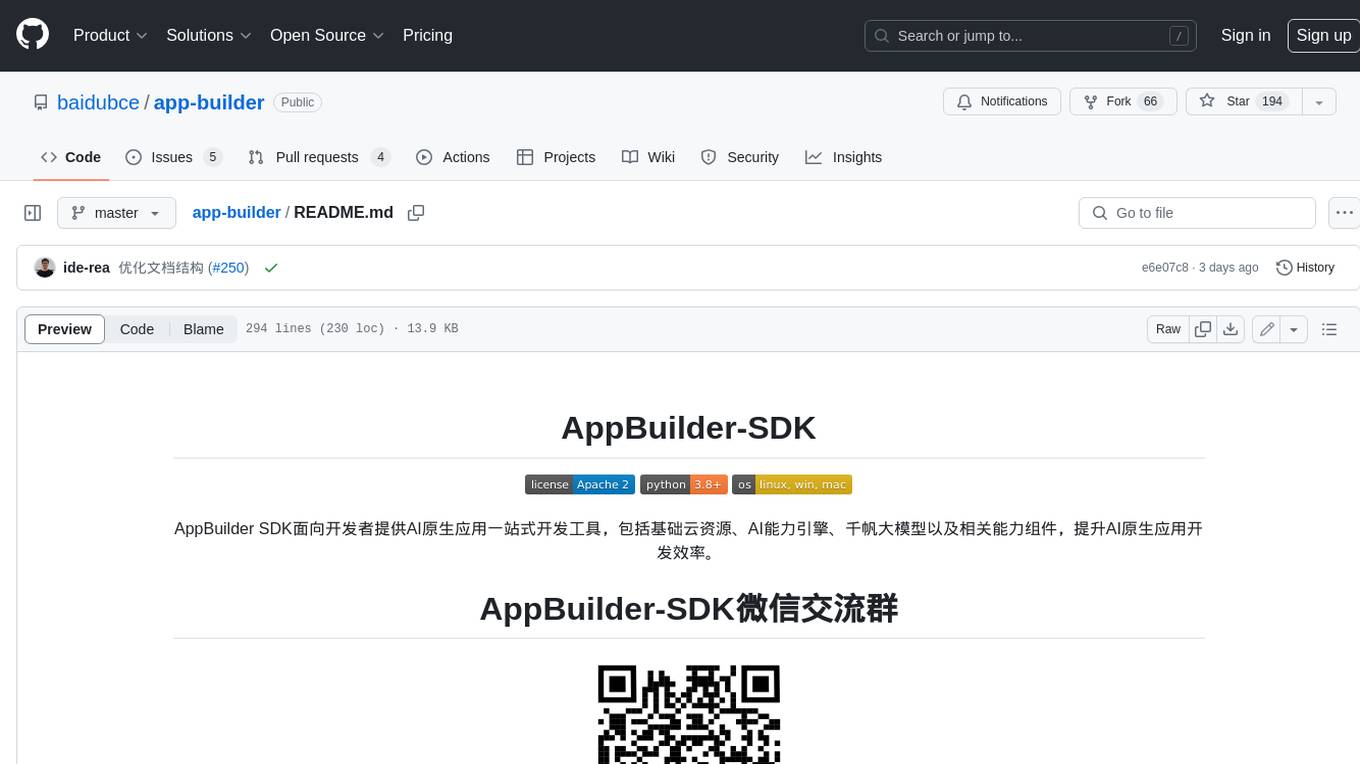
app-builder
AppBuilder SDK is a one-stop development tool for AI native applications, providing basic cloud resources, AI capability engine, Qianfan large model, and related capability components to improve the development efficiency of AI native applications.
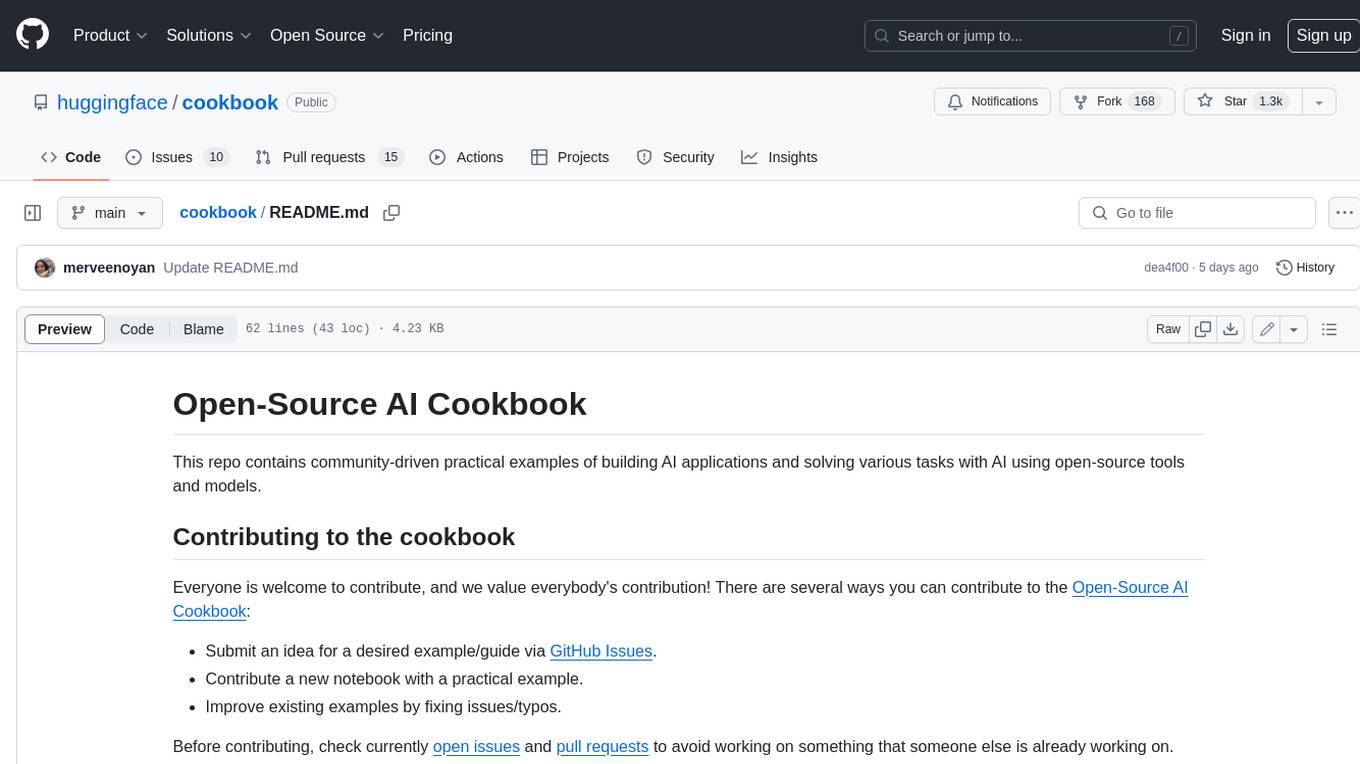
cookbook
This repository contains community-driven practical examples of building AI applications and solving various tasks with AI using open-source tools and models. Everyone is welcome to contribute, and we value everybody's contribution! There are several ways you can contribute to the Open-Source AI Cookbook: Submit an idea for a desired example/guide via GitHub Issues. Contribute a new notebook with a practical example. Improve existing examples by fixing issues/typos. Before contributing, check currently open issues and pull requests to avoid working on something that someone else is already working on.
For similar jobs

sweep
Sweep is an AI junior developer that turns bugs and feature requests into code changes. It automatically handles developer experience improvements like adding type hints and improving test coverage.

teams-ai
The Teams AI Library is a software development kit (SDK) that helps developers create bots that can interact with Teams and Microsoft 365 applications. It is built on top of the Bot Framework SDK and simplifies the process of developing bots that interact with Teams' artificial intelligence capabilities. The SDK is available for JavaScript/TypeScript, .NET, and Python.

ai-guide
This guide is dedicated to Large Language Models (LLMs) that you can run on your home computer. It assumes your PC is a lower-end, non-gaming setup.

classifai
Supercharge WordPress Content Workflows and Engagement with Artificial Intelligence. Tap into leading cloud-based services like OpenAI, Microsoft Azure AI, Google Gemini and IBM Watson to augment your WordPress-powered websites. Publish content faster while improving SEO performance and increasing audience engagement. ClassifAI integrates Artificial Intelligence and Machine Learning technologies to lighten your workload and eliminate tedious tasks, giving you more time to create original content that matters.

chatbot-ui
Chatbot UI is an open-source AI chat app that allows users to create and deploy their own AI chatbots. It is easy to use and can be customized to fit any need. Chatbot UI is perfect for businesses, developers, and anyone who wants to create a chatbot.

BricksLLM
BricksLLM is a cloud native AI gateway written in Go. Currently, it provides native support for OpenAI, Anthropic, Azure OpenAI and vLLM. BricksLLM aims to provide enterprise level infrastructure that can power any LLM production use cases. Here are some use cases for BricksLLM: * Set LLM usage limits for users on different pricing tiers * Track LLM usage on a per user and per organization basis * Block or redact requests containing PIIs * Improve LLM reliability with failovers, retries and caching * Distribute API keys with rate limits and cost limits for internal development/production use cases * Distribute API keys with rate limits and cost limits for students

uAgents
uAgents is a Python library developed by Fetch.ai that allows for the creation of autonomous AI agents. These agents can perform various tasks on a schedule or take action on various events. uAgents are easy to create and manage, and they are connected to a fast-growing network of other uAgents. They are also secure, with cryptographically secured messages and wallets.

griptape
Griptape is a modular Python framework for building AI-powered applications that securely connect to your enterprise data and APIs. It offers developers the ability to maintain control and flexibility at every step. Griptape's core components include Structures (Agents, Pipelines, and Workflows), Tasks, Tools, Memory (Conversation Memory, Task Memory, and Meta Memory), Drivers (Prompt and Embedding Drivers, Vector Store Drivers, Image Generation Drivers, Image Query Drivers, SQL Drivers, Web Scraper Drivers, and Conversation Memory Drivers), Engines (Query Engines, Extraction Engines, Summary Engines, Image Generation Engines, and Image Query Engines), and additional components (Rulesets, Loaders, Artifacts, Chunkers, and Tokenizers). Griptape enables developers to create AI-powered applications with ease and efficiency.



